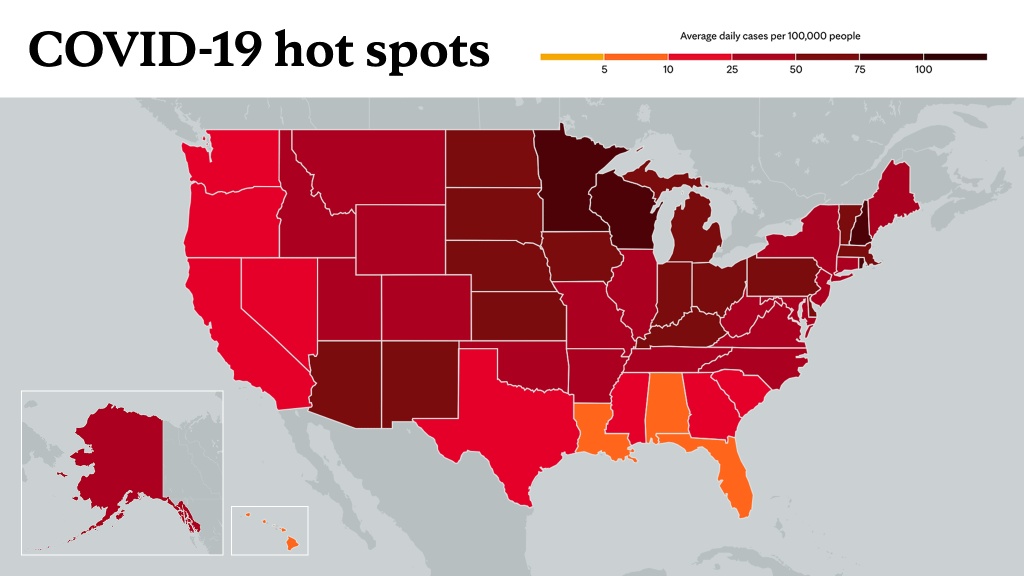-
COVID-19
Mayo Clinic Q and A: Vaccines and boosters for COVID-19 omicron strain

DEAR MAYO CLINIC: I am 36 and work remotely. I have received a two-dose series of the COVID-19 vaccine, but as I am hearing more about the new omicron variant, I'm wondering if I need a booster shot? Also, I have child who will be 5 in a few weeks. Should I get my daughter vaccinated now or wait for a new vaccine based on this new strain?
ANSWER: Omicron, a new COVID-19 variant of concern, has been detected in all regions of the world, including North America. Research and clinical observations on the new strain are underway, but the emergence of omicron is a reminder to take important steps to protect yourself against COVID-19.
The omicron variant was first reported by South Africa in early November, and the Centers for Disease Control and Prevention reported it in the U.S. recently.
There are a lot of unknowns still regarding this variant, including if this variant is more transmissible, as transmissible or less transmissible than the current delta variant that remains prevalent in many parts of the U.S.
The second big unknown is whether this variant has immune escape, meaning will vaccines provide the same amount of protection that they currently do or will they offer less protection.
Thirdly, we do not know what the severity of this omicron variant is — if this variant is more likely to land people in the hospital than prior variants were.
Based on the available information, the World Health Organization recently classified the new COVID-19 strain as a variant of concern. This means it has the potential to cause some continued spread and become a dominant strain. There are several other variants of concern that have been tracked, and some of them, like delta, have become significant problems.
As we are learning more about omicron, recognizing the number of mutations with COVID-19, people should be concerned and continue to follow appropriate behaviors and protocols to prevent the spread of COVID-19.
The best ways to stay protected against COVID-19 remain the same things that they've been for most of this year. Namely, if you are vaccine-eligible, get the vaccine. If you're booster-eligible, get the booster.
In late November, the Advisory Committee on Immunization Practices approved Moderna and Pfizer COVID-19 booster vaccinations for all eligible people 18 and older. Previously, boosters were only approved for certain groups, such as health care workers and people 65 and older.
A study published in The New England Journal of Medicine shows that people who received a Pfizer COVID-19 booster vaccination were 11 times more protected from infection, compared to those who have completed their initial two-dose vaccination series. And full effectiveness of the currently available COVID-19 vaccines appears to wane slightly over time, so the sooner you can receive a booster, the better.
At this point, any adults who are six months past completing their initial Moderna or Pfizer COVID-19 vaccination series are eligible to receive a booster dose, as are adults who are two months past completing their initial dose of the Johnson & Johnson vaccine.
Mayo Clinic strongly recommends that anyone eligible for the booster receive a booster dose.
Additionally, with respect to your daughter, it is recommended that you have her vaccinated as soon as she is eligible. Although we don't know much about this new strain of COVID-19, the delta variant still remains a threat. Waiting to get your daughter vaccinated puts her at risk for COVID-19 infection.
Also, you should wear masks in appropriate settings, such as areas where other people are unmasked or you're unsure of their vaccination status. And, finally, if you have symptoms that are concerning for COVID-19, check with your health care provider and get appropriate testing so that you don't expose others. — Dr. John O'Horo, Infectious Diseases, Mayo Clinic, Rochester, Minnesota
____________________________________________
Information in this post was accurate at the time of its posting. Due to the fluid nature of the COVID-19 pandemic, scientific understanding, along with guidelines and recommendations, may have changed since the original publication date.
For more information and all your COVID-19 coverage, go to the Mayo Clinic News Network and mayoclinic.org.
Learn more about tracking COVID-19 and COVID-19 trends.








